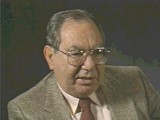<< Previous | Displaying results 91-100 of 571 for "" | Next >>
-
Sandor (Shony) Alex Braun describes how music gave him the strength to survive while imprisoned in concentration camps
Oral HistoryShony was born to religious Jewish parents in a small Transylvanian city. He began to learn the violin at age 5. His town was occupied by Hungary in 1940 and by Germany in 1944. In May 1944, he was deported to the Auschwitz camp in Poland. He was transferred to the Natzweiler camp system in France and then to Dachau, where he was liberated by US troops in April 1945. In 1950, he immigrated to the United States, and became a composer and a professional violinist.
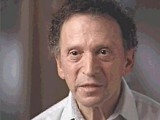
-
Charlene Schiff describes conditions in the Horochow ghetto
Oral HistoryBoth of Charlene's parents were local Jewish community leaders, and the family was active in community life. Charlene's father was a professor of philosophy at the State University of Lvov. World War II began with the German invasion of Poland on September 1, 1939. Charlene's town was in the part of eastern Poland occupied by the Soviet Union under the German-Soviet Pact of August 1939. Under the Soviet occupation, the family remained in its home and Charlene's father continued to teach. The Germans…
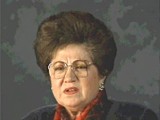
-
Henny Fletcher Aronsen describes living conditions in the Kovno ghetto
Oral HistoryHenny was born into an upper-middle-class Jewish family in Kovno, Lithuania. She and her brother attended private schools. In June 1940 the Soviets occupied Lithuania, but little seemed to change until the German invasion in June 1941. The Germans sealed off a ghetto in Kovno in August 1941. Henny and her family were forced to move into the ghetto. Henny married in the ghetto in November 1943; her dowry was a pound of sugar. She survived several roundups during which some of her friends and family were…
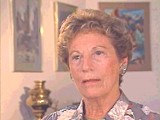
-
Rachel Mutterperl Goldfarb describes partisan attacks on Germans
Oral HistoryThe Germans established a ghetto in Dokszyce in late 1941. Rachel hid during the liquidation of the ghetto in 1942, and she and her mother escaped to another ghetto. When the second ghetto was about to be liquidated, they escaped again. Rachel and her mother joined a band of partisans in the forest. She helped her mother to cook, and also cleaned weapons. Rachel and her mother tried to leave Europe when the war ended. They eventually arrived in the United States, in 1947.
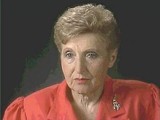
-
Rachel Mutterperl Goldfarb describes how partisans obtained weapons from German soldiers
Oral HistoryThe Germans established a ghetto in Dokszyce in late 1941. Rachel hid during the liquidation of the ghetto in 1942, and she and her mother escaped to another ghetto. When the second ghetto was about to be liquidated, they escaped again. Rachel and her mother joined a band of partisans in the forest. She helped her mother to cook, and also cleaned weapons. Rachel and her mother tried to leave Europe when the war ended. They eventually arrived in the United States, in 1947.
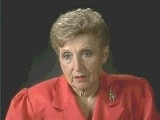
-
Frank Bleichman describes conditions in and dangers facing a partisan camp in the forests of Poland
Oral HistoryFrank was one of seven children born to a religious Jewish family in Kamionka, in the Lublin district of Poland. Germany invaded Poland in September 1939. When deportations of Jews from the Lublin area began in 1942, Frank joined a group of Jewish partisans who roamed the forests in search of weapons and food. After obtaining weapons by posing as Soviet paratroopers, they were able to defend themselves against German raids and take revenge against collaborators. They gradually made connections with Polish…
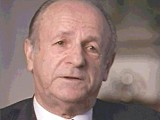
-
Frank Bleichman describes a German raid, with assistance from individual Poles, on a group of Jewish partisans
Oral HistoryFrank was one of seven children born to a religious Jewish family in Kamionka, in the Lublin district of Poland. Germany invaded Poland in September 1939. When deportations of Jews from the Lublin area began in 1942, Frank joined a group of Jewish partisans who roamed the forests in search of weapons and food. After obtaining weapons by posing as Soviet paratroopers, they were able to defend themselves against German raids and take revenge against collaborators. They gradually made connections with Polish…
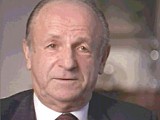
-
Abraham Lewent describes food shortages after the invasion of Warsaw
Oral HistoryLike other Jews, the Lewents were confined to the Warsaw ghetto. In 1942, as Abraham hid in a crawl space, the Germans seized his mother and sisters in a raid. They perished. He was deployed for forced labor nearby, but escaped to return to his father in the ghetto. In 1943, the two were deported to Majdanek, where Abraham's father died. Abraham later was sent to Skarzysko, Buchenwald, Schlieben, Bisingen, and Dachau. US troops liberated Abraham as the Germans evacuated prisoners.
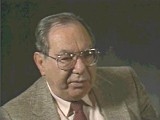
-
Abraham Lewent describes conditions in the Warsaw ghetto
Oral HistoryLike other Jews, the Lewents were confined to the Warsaw ghetto. In 1942, as Abraham hid in a crawl space, the Germans seized his mother and sisters in a raid. They perished. He was deployed for forced labor nearby, but escaped to return to his father in the ghetto. In 1943, the two were deported to Majdanek, where Abraham's father died. Abraham later was sent to Skarzysko, Buchenwald, Schlieben, Bisingen, and Dachau. US troops liberated Abraham as the Germans evacuated prisoners.
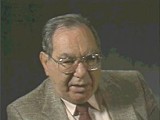
-
Abraham Lewent describes hiding during a raid in which his mother and sisters were seized for deportation from Warsaw to Treblinka
Oral HistoryLike other Jews, the Lewents were confined to the Warsaw ghetto. In 1942, as Abraham hid in a crawl space, the Germans seized his mother and sisters in a raid. They perished. He was deployed for forced labor nearby, but escaped to return to his father in the ghetto. In 1943, the two were deported to Majdanek, where Abraham's father died. Abraham later was sent to Skarzysko, Buchenwald, Schlieben, Bisingen, and Dachau. US troops liberated Abraham as the Germans evacuated prisoners.
